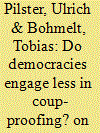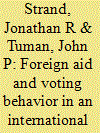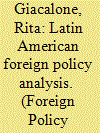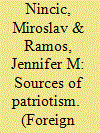|
|
|
Sort Order |
|
|
|
Items / Page
|
|
|
|
|
|
|
| Srl | Item |
| 1 |
ID:
117848


|
|
|
|
|
| Publication |
2012.
|
| Summary/Abstract |
The existing literature on military effectiveness established the robust claim that democracies are more successful and effective in winning interstate wars. One mechanism that explains this relationship heavily draws upon the underlying effect of regime type on civil-military relations. Still, this relationship has not yet been explored systematically, and rigorous empirical research on this issue remains surprisingly scarce. In order to address this shortcoming, this study investigates the patterns of civil-military relations according to different regime types, that is, democracies and nondemocracies. More specifically, the authors examine whether and how democracies invest in coup-proofing, that is, strategies employed to prevent the military from seizing power. The main argument is derived from a principal-agent logic and claims that coup-proofing is both a relatively less attractive and necessary instrument for democratic principals. By analyzing newly compiled time-series cross-sectional data on states' coup-proofing efforts in 1975-1999, the core hypothesis is tested in a quantitative framework.
|
|
|
|
|
|
|
|
|
|
|
|
|
|
|
|
| 2 |
ID:
117851


|
|
|
|
|
| Publication |
2012.
|
| Summary/Abstract |
This study examines the relationship between Japanese foreign aid disbursement and recipient state membership and voting in the International Whaling Commission (IWC). Focusing on 104 countries for the period 1994-2005, we investigate whether Japan gives more aid to IWC members that vote with Japan. The effects of the independent variables are estimated with a linear mixed regression model. Controlling for other possible influences on official development assistance (ODA) disbursements, and employing different measures of dyadic voting similarity, the study finds Japanese aid concentrates in members of the IWC that are microstates. The findings of the paper also indicate that microstate members of the IWC who align their votes with Japan are more likely to receive Japanese ODA. By demonstrating that Japan's strategy is focused on microstates, the study provides a more refined understanding of the mechanisms Japan employs to end the IWC's moratorium on commercial whaling.
|
|
|
|
|
|
|
|
|
|
|
|
|
|
|
|
| 3 |
ID:
117847


|
|
|
|
|
| Publication |
2012.
|
| Summary/Abstract |
This article reviews the evolution of foreign policy analysis (FPA) in Latin America in order to explore the role played by domestic contextual factors and external theoretical influences. Applying notions that Jorgensen (Journal of International Relations6 (1):9-42) has employed for the study of European FPA, it concludes that incorporating the cultural-institutional context in which Latin American academics write enhances our understanding of national variations and of how internal and external factors get connected.
|
|
|
|
|
|
|
|
|
|
|
|
|
|
|
|
| 4 |
ID:
117850


|
|
|
|
|
| Publication |
2012.
|
| Summary/Abstract |
This research tests theories for explaining recent German decisions to deploy or not deploy forces abroad. Underpinning this research is the rejection of a common scholarly reaction to German intervention policy, which is to disregard it as irrational or simply inexplicable, thereby degrading our overall understanding of interventions. Four approaches for unraveling this puzzle are tested, three common to the foreign policy literature but a fourth is borrowed from social psychology. Each of these approaches predicts to subsequent behaviors by first establishing decision maker "problem representations" emphasizing the process of option generation rather than option selection. Verbatim parliamentary statements of German representatives are coded for periods between 1990 and 2006. The study hypothesizes that the observation of problem representations provides a hitherto lacking theoretical structure to decisions. Data from 1,436 speeches provide mixed evidence. First, it indicates that German decision making vis-à-vis foreign military interventions is systematic and theoretically structured. Among the patterns is the importance of institutionalist problem representations. Also, results indicate a strength of realist problem representations and a weakness of historical-cultural problem representations with the main exception of the Lebanon occasion. The study concludes with observations on the generalizability of these findings to other decision-making contexts.
|
|
|
|
|
|
|
|
|
|
|
|
|
|
|
|
| 5 |
ID:
117853


|
|
|
|
|
| Publication |
2012.
|
| Summary/Abstract |
A burgeoning body of literature assesses the sociopolitical factors that influence investment decisions, including the nature of domestic institutions, societal rights, and participation in international institutions and agreements. Oddly enough, these have evolved largely as separate lines of research, and little effort has been made to compare the relative importance of these sociopolitical factors in making investment decisions. Moreover, though the diverse nature of foreign direct investment (FDI) is widely noted, extant research relies almost exclusively upon the examination of aggregate FDI. As a result, scholars have little insight into the ways that investors prioritize these factors, or how they vary across different industries. In an effort to synthesize these strands of research and further deepen our understanding of the determinants of investment decisions, this study models the prospective impact of several sociopolitical variables that have been found to significantly influence FDI-human rights, democratic governance, and commitment to international trade agreements and investment treaties-across multiple investment sectors.
|
|
|
|
|
|
|
|
|
|
|
|
|
|
|
|
| 6 |
ID:
117849


|
|
|
|
|
| Publication |
2012.
|
| Summary/Abstract |
Patriotism, as attachment to country, is the value on which most foreign policy attitudes ultimately hinge, yet very little in the academic literature addresses the implications of the way in which the foundations for this attachment are conceived. Two variants of patriotism can be identified: one absolute, the other contingent. For those holding the latter conception, patriotism must be justified by one's country's actions: the greater the approval of one's country's policies, the greater the degree of patriotic attachment that is warranted. For those holding the former conception, patriotism is an absolute and a constant value, and it is reflected in support for one's country when the going gets tough. We seek to understand the circumstances that determine how critical or uncritical a patriot a person would be, given both specific conditions related to the individual and the international situation more generally. Moreover, we are interested in accounting for overall levels of patriotism. We use survey data from the PEW, as well as experimental data, to examine these matters. We find that factors internal to the individual, and not external conditions, determine the kind of patriot one is; at the same time, overall patriotism is found to be influenced by both internal and external circumstances.
|
|
|
|
|
|
|
|
|
|
|
|
|
|
|
|
|
|
|
|
|